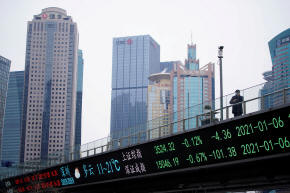Stocks slip as bond markets suggest pain for U.S. economy
 Send a link to a friend
Send a link to a friend
 [March 30, 2022] By
Tom Wilson and Alun John [March 30, 2022] By
Tom Wilson and Alun John
LONDON/HONG KONG (Reuters) - European
shares fell on Wednesday as bond markets suggested pain ahead for the
U.S. economy, tempering hopes of a negotiated end to the Ukraine
conflict that had earlier buoyed equities.
The broad Euro STOXX 600 fell 0.8% in early trade after three sessions
of gains that have taken the index back to levels reached before Russia
invaded Ukraine.
Benchmark indexes in Frankfurt and Paris lost 1% and 1.3% respectively,
with London shares also slipping a touch. Among significant losses was
drugmaker Roche, which dropped 1.3% after a lung cancer drug failed to
meet targets in a late-stage trial.
Bond investors had bet overnight that aggressive tightening of policy by
the U.S. Federal Reserve could harm the world's biggest economy over the
longer term.
The widely tracked U.S. 2-year-10-year Treasury yield curve briefly
inverted on Tuesday for the first time since September 2019. [US/]

Longer-dated yields falling below shorter ones indicate a lack of faith
in future growth, with 10-year yields falling beneath 2-year rates
widely viewed as a harbinger of recession.
Market players said the signals coming from bond markets were at odds
with the mood in equity markets.
"It's a complete diversion of fixed income and the equity market," said
Sebastien Galy, senior macro strategist at Nordea Asset Management.
"Equity markets are overly optimistic and the fixed income markets are
probably being overly pessimistic."
An inverted Treasury curve has in recent decades been followed by a
recession within two years, including the 2020 downturn caused by the
COVID-19 pandemic.
Graphic: U.S. yield curve inverts-https://fingfx.thomsonreuters.com/
gfx/mkt/gkvlgqbwzpb/morningbid.PNG
Shares rallied in Asia and Wall Street overnight after Ukraine had
proposed on Tuesday that it take on neutral status, seen as a sign of
progress in face-to-face peace negotiations.
On the ground, however, reports of attacks continued and Ukraine reacted
with scepticism to Russia's promise in negotiations to scale down
military operations around Kyiv.
MSCI's broadest index of Asia-Pacific shares outside Japan rose 1.3% to
its highest in nearly a month, with most Asian stock markets in positive
territory.
[to top of second column] |

A man stands on an overpass with an electronic board showing
Shanghai and Shenzhen stock indexes, at the Lujiazui financial
district in Shanghai, China January 6, 2021. REUTERS/Aly Song//

Yet the rally fizzled, with U.S. S&P 500 futures turning negative and pointing
to losses of about 0.3%.
The MSCI world equity index, which tracks shares in 50 countries, was up 0.1%.
"That both sides might be edging closer towards one another has seen markets
reduce the perceived likelihood of further escalation scenarios," Deutsche Bank
analysts wrote.
"The alternative view is that the Russians are simply diverting resources to
other areas and this is purely tactical."
JAPAN IN FOCUS
The benchmark U.S. 10-year yield was last at 2.3835%, having risen as high as
2.557% on Monday for its highest since April 2019, as traders position
themselves for quickfire increases to interest rates by the U.S. Federal
Reserve.
The impact of rising U.S. yields played out elsewhere, dragging Japanese
government bond yields in their wake in a threat to Japan's ultra loose monetary
policy.
The Bank of Japan increased efforts to defend its key yield cap on Wednesday,
offering to ramp up buying of government bonds across the curve, including
unscheduled emergency market operations.
The widening gap between U.S. and Japanese yields has caused the yen to weaken
sharply, but it managed to regain some lost ground on Wednesday.

The Japanese currency rose 0.8% to 121.87 per dollar, compared with Monday's low
of 124.3, with traders pointing to rising fears that Japanese authorities might
step in to bolster the yen. [FRX/]
Elsewhere in currency markets, the euro was up 0.3% at $1.11, supported by the
Russia-Ukraine peace talks.
(Reporting by Tom Wilson in London and Alun John in Hong Kong; Editing by Simon
Cameron-Moore and David Goodman)
[© 2022 Thomson Reuters. All rights
reserved.]This material may not be published,
broadcast, rewritten or redistributed.
Thompson Reuters is solely responsible for this content. |